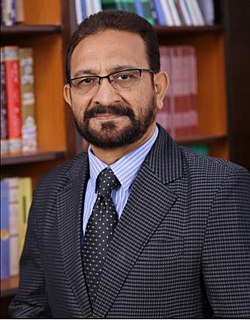In Islam, Sunnah, also sunna or sunnat are the traditions and practices of the Islamic prophet, Muhammad, that constitute a model for Muslims to follow. The sunnah is what all the Muslims of Muhammad's time, evidently saw and followed and passed on to the next generations. According to classical Islamic theories, the sunnah are documented by hadith, and along with the Quran, are the divine revelation (Wahy) delivered through Muhammad that make up the primary sources of Islamic law and belief/theology. Differing from Sunni classical Islamic theories are those of Shia Muslims, who hold that the Twelve Imams interpret the sunnah, and Sufi who hold that Muhammad transmitted the values of Sunnah "through a series of Sufi teachers."

Translations of the Qurʻan are considered interpretations of the scripture of Islam in languages other than Arabic. The Qurʻan was originally written in the Arabic language and has been translated into most major African, Asian and European languages.

The Pen is the sixty-eighth chapter (sūrah) of the Qur'an with 52 verses (āyāt). Quran 68 describes God's justice and the judgment day. Three notable themes of this Surah are response to the opponents objections, warning and admonition to the disbelievers, and exhortation of patience to the Islamic prophet Muhammad. Chronologically, this is the first appearance of any of the "disjointed" [i.e., single] letters (muqattaat) which precede a number of the surahs of the Qur'an while in Quranic order this is the last surah to have the appearance of (muqattaat).

Al-Ḥijr is the 15th Quranic chapter (sūrah). It has 99 verses (āyāt).

al-Maʻārij is the seventieth chapter (sūrah) of the Qur'an with 44 verses (āyāt). The Surah takes its name from the word dhil Ma'arij in 3rd ayah. The word appears twice in the Quran. Abdullah Yusuf Ali an Indian Islamic scholar introduces the surah as “This is another Islamic eschatology Surah closely connected in subject matter with the last one. Patience and the mystery of Time will show the ways that climb the Heaven. Sin and Goodness must each eventually come to its own.”

The Holy Qur'an: Text, Translation and Commentary is an English translation of the Qur'an by the anglophile British Indian Ismaili Bohri Shi'ite Muslim civil servant Abdullah Yusuf Ali (1872–1953) during the British Raj. It has become among the most widely known English translations of the Qur'an, due in part to its prodigious use of footnotes, and its distribution and subsidization by Saudi Arabian beneficiaries during the late 20th century.

The Quran has been translated into English many times. The first few translations were made in the 17th and 19th centuries, but the majority were produced in the 20th and 21st.

Hakeem Noor-ud-Din was a close companion of Mirza Ghulam Ahmad, the founder of the Ahmadiyya Movement, and was chosen as his first successor on 27 May 1908, a day after his death, becoming the first caliph and leader of the worldwide Ahmadiyya Muslim Community. He was a renowned physician, writer, theologian, and an expert in Arabic and Hebrew.

Tafseer-e-Kabeer is a 10 volume Urdu exegesis of the Quran written by Mirza Bashir-ud-Din Mahmud Ahmad, the second Caliph of the Ahmadiyya Muslim Community, written over a period of 20 years. It is often seen as his masterpiece.

Allama Khalid Masud was a Muslim scholar of Pakistan. He spent the major part of his life with Moulana Amin Ahsan Islahi. He conveyed ideas and thoughts of his teacher and Imam Farhi to general public. He wrote a number of books and articles and delivered lectures on Islam, science and other subjects.

The view on the Prophets of God in Ahmadiyya theology differs significantly from Orthodox Islam. The main difference centres on the Quranic term Khatam an-Nabiyyin with reference to Muhammad which is understood by Ahmadis in terms of perfection and testification of prophethood instead of chronological finality. Accordingly, Muhammad is held to be the last prophet to deliver a religious law to humanity in the form of the Quran whose teachings embody a perfected and universal message. Although, in principle, prophets can appear within Islam but they must be non-lawbearing prophets dependent upon the sharia of Muhammad. Their prophethood is reflective of that of Muhammad, that is, within his Seal; and their role is merely that of reviving and purifying the faith. They cannot be prophets in their own right and cannot change, add to or subtract from the religious law of Islam. As such, Ahmadis, regard their founder Mirza Ghulam Ahmad as a prophet who appeared as the promised Messiah and Mahdi in accordance with Islam's eschatological prophecies. In contrast to mainstream Muslims who believe Jesus to be still alive and one who would return himself towards the end of time, Ahmadis believe Jesus to have died a natural death and view the coming of such an independent, Israelite prophet to amount to breaking the Seal of Prophethood.

Prophets in Islam are individuals who were sent by Allah to various communities in order to serve as examples of ideal human behavior and to spread Allah's message on Earth. Some prophets are categorized as messengers, those who transmit divine revelation, most of them through the intercession of an angel. Muslims believe that many prophets existed, including many not mentioned in the Quran. The Quran states: "There is a Messenger for every community". Belief in the Islamic prophets is one of the six articles of the Islamic faith.
Tafsir Ishraq al-Ma’ani is a commentary on the Qur'an (tafsir) in the English language by Indian Islamic scholar Syed Iqbal Zaheer, who was an editor of the Bangalore-based weekly Islamic magazine Young Muslim Digest.

Akhundzada Mohammad Abdul Ghafoor Hazarvi was a Muslim theologian, jurist, and scholar of ahadith in Pakistan. He was active in the Pakistan movement, member of Council of Islamic Ideology. He was the companion of Muhammad Ali Jinnah and separatist leader Maulana Zafar Ali Khan and was active in the independence movement of Pakistan against the British Raj. He was a Sufi of the Chishti Sufi order and the founding member of the religious Barelvi Sunni strain political party Jamiat Ulema-e-Pakistan (JUP). He became its president in 1948. He was also a political figure in Pakistan and was the first recipient of Nishan-e-Imtiaz by the President of Pakistan. He was also the chairman of Majlis-e-Tahaffuz-e-Khatme Nabuwwat, an organisation opposed to the Ahmadiyya Movement that waged a campaign against Mirza Ghulam Ahmed's claim of prophethood.

The Ahmadiyya movement in Islam has relationships with a number of other religions. Ahmadiyya consider themselves to be Muslim, but are not regarded as Muslim by mainstream Islam.

Quṭb-ud-Dīn Aḥmad Walīullāh Ibn ʿAbd-ur-Raḥīm Ibn Wajīh-ud-Dīn Ibn Muʿaẓẓam Ibn Manṣūr Al-ʿUmarī Ad-Dehlawī, commonly known as Shāh Walīullāh Dehlawī, was an Islamic scholar, muhaddith, renewer, historiographer, bibliographer, theologian, and philosopher.

Quranism comprises views that Islamic law and guidance should only be based on the Qur'an, thus completely or partially opposing the religious authority, reliability, and/or authenticity of hadith literature. Quranists believe that God's message in the Quran is clear and complete as it is, because the Quran says so, and that it can therefore be fully understood without referencing the hadith, which they believe are forged.

Professor Dr. Muhammad Ahmed Qadri is a political scientist having served as the Dean Faculty of Arts and Social Sciences and Dean Faculty of Islamic Studies at the University of Karachi in Pakistan. Dr. Qadri is the former Vice Chancellor of Nazeer Hussain University in Karachi. He is an educator, political scientist, founder of Islamic Educational and Cultural Research Center North America and has authored several books about Islam in the contemporary world.
Darussalam International Publishing & Distribution is a Saudi based multilingual international publishing house operates in 35 countries. It's the second-largest publisher of translations of the islamic scripture (Qurʼān) in the world after King Fahd Complex.








